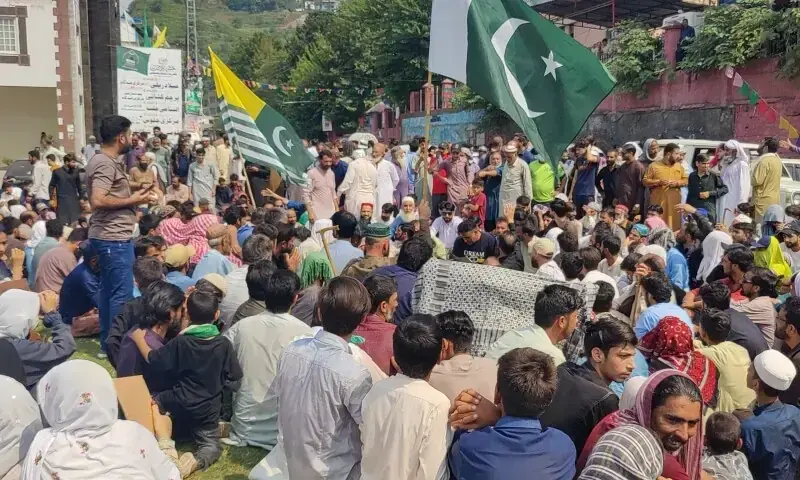Strike Paralyzes Daily Life
A complete strike swept across Azad Jammu and Kashmir (AJK) on Sunday as the Joint Awami Action Committee (JAAC) called for a “shutter-down and wheel-jam” protest. Shops and markets were closed, public transport vanished from the roads, and many classrooms in open schools remained empty.
The strike brought daily life to a standstill. Ordinary citizens reported major disruptions in travel, communication, and commerce. For many families, the inability to access basic services caused frustration.
A Charter of 38 Demands
At the heart of the protest lies a detailed 38-point charter presented by the JAAC. The document demands sweeping reforms, addressing both economic hardship and governance issues. Key points include:
-
Ending privileges for political and bureaucratic elites
-
Reducing prices of flour and electricity
-
Abolishing reserved assembly seats for Kashmiri refugees
-
Ensuring free and equal education
-
Providing interest-free loans for young people
-
Expanding infrastructure in neglected regions such as Lohar Gali, Shounter Tunnel, and Leepa Valley
-
Enforcing judicial rulings on hydropower projects
-
Cutting taxes while ending bribery and political patronage
-
Guaranteeing local employment and judicial reforms
-
Restoring student unions and empowering local government representatives
These demands reflect widespread concerns about rising living costs, lack of accountability, and uneven development across the region.
Digital Blackout Deepens Public Anger
Authorities shut down internet, mobile, and landline services during the strike, citing security concerns. This digital blackout, however, drew sharp criticism from protesters.
Residents complained that cutting communication not only blocked coordination but also disrupted businesses and education. Students preparing for examinations were left unable to access online resources. Shopkeepers who rely on digital transactions also suffered losses.
Public Response and Political Support
The JAAC accuses the government of repeatedly making promises without meaningful action. According to protesters, the strike was the only way to force authorities to respond.
The movement has gained support from local political actors, including Pakistan Tehreek-e-Insaf (PTI) AJK, which has publicly endorsed the protests. Smaller parties and civil society groups have also voiced solidarity, reflecting growing dissatisfaction across social and political divides.
Appeal to International Community
The JAAC leadership sent letters to the United Nations Secretary-General and global human rights organizations. They requested independent investigations into reported killings, arrests, and crackdowns during earlier phases of the protest movement.
While exact figures on casualties remain unclear, rights groups in Pakistan-administered Kashmir have previously raised concerns about excessive use of force by authorities during demonstrations.
Government Stresses Dialogue
Responding to the unrest, government spokesperson Dr. Irfan Ashraf insisted that dialogue with protest leaders is ongoing.
“The state remains peaceful, and the government is committed to resolving issues seriously,” he said. Officials claim that constructive negotiations are under way, though no timeline has been shared for addressing the demands.
Heavy Security Deployment
Security forces have been placed on high alert. More than 3,000 personnel, including police, Rangers, and Islamabad police, were deployed across major districts, particularly in Muzaffarabad.
Authorities said the deployment was necessary to prevent violence. However, residents fear the heavy presence could escalate tensions if negotiations stall.
Broader Context
The protests in AJK highlight growing frustration with economic inequality and governance in Pakistan-administered territories. Electricity prices in the region have risen sharply over recent years, even though AJK hosts several hydropower projects supplying power to Pakistan’s national grid.
Similarly, residents complain of underdeveloped infrastructure despite contributing significant natural resources. Calls for reform reflect long-standing grievances about local autonomy and political representation.
Outlook
As the strike continues, pressure is mounting on the government to offer concrete concessions. Protesters insist they will not step back without commitments on electricity tariffs, food prices, and institutional reforms.
With communications restricted and security forces deployed in large numbers, the situation remains tense. The coming days will determine whether dialogue can defuse the unrest or whether the protests will intensify further.















